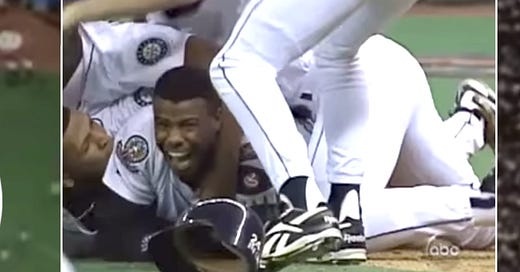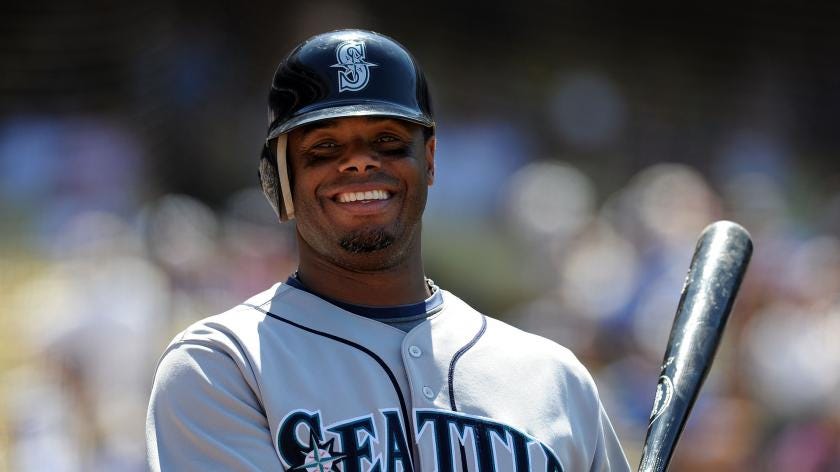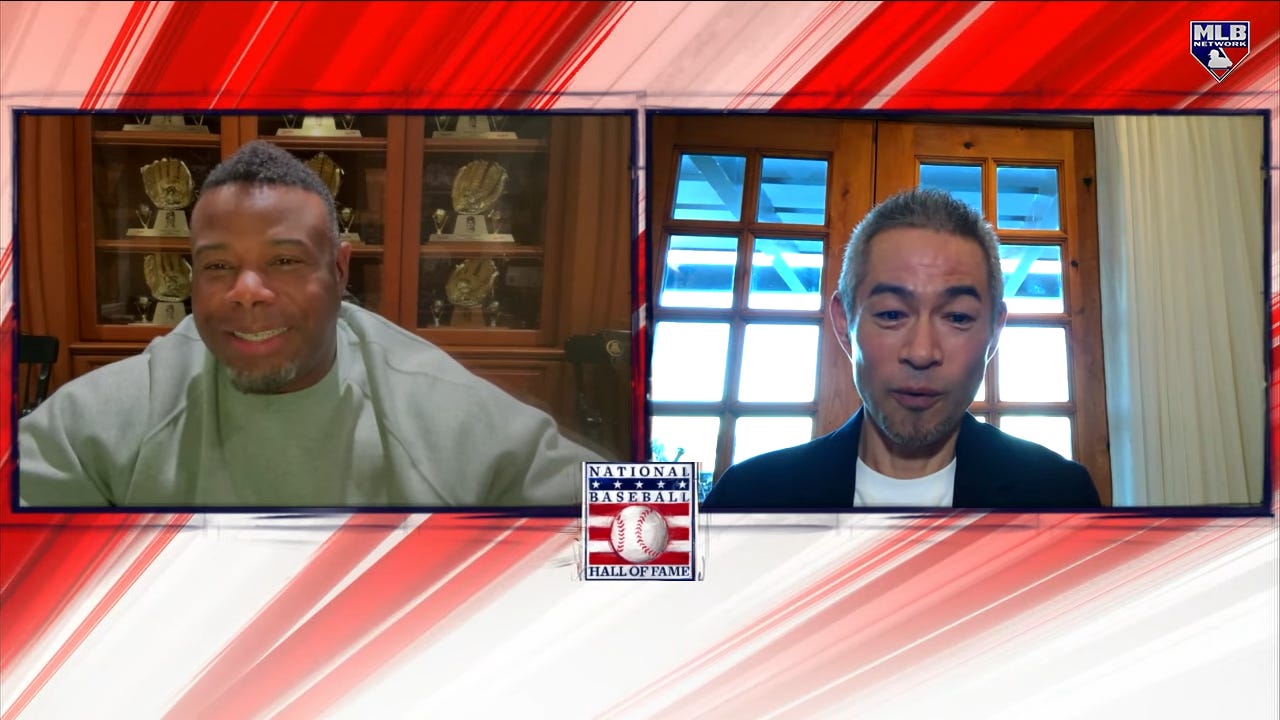non-romance, romance, #16: The History of the Seattle Mariners (2020, dir. Jon Bois)
what is a happily-ever-after?
Happy Opening Day of baseball! This is another entry in my Non-Romance Romance series, a monthly series where I talk about literature/film that is not typically classed as romances with romance as a framework. Now a monthly series! I’ve done one sports themed one of these before, about There’s Always This Year by Hanif Abdurraqib, one of the best books I’ve ever read and this one is about one of the best documentaries I’ve ever seen.
Objectively, your sports team is more likely to lose a season than it is to win one, if the measure of that win is a national championship. Some teams, in the short relative timeframe of modern American sports, are more likely to win than others, though that doesn’t necessarily mean they are ever going to win again. English football seems to have a nice way of moving goal posts to set the expectations for the season: any team can beat any team, but some teams are mainly looking to win their derbies or make European competitions, though any given year could be a magical Leicester City in 2015-2016 (or a tragic Leicester City in 2022-2023).
I’ve expressed a point of pride that I am an avowed fan of the losingest team in sports, but one way the Philadelphia Phillies have achieved this is by being around for a really long time. They’re also the longest single name, single city franchise in the United States. They’ve lost 11,000+ games, but they’ve won 10,000+!
But the Seattle Mariners have a similar win-loss percentage and no World Series to show for it. The History of the Seattle Mariners directed by Jon Bois, produced by SB Nation, is, in many ways, the spiritual counter to The Last Dance, directed by Jason Hehir, produced by ESPN Films. Both were released within the first month of the 2020 COVID lockdowns. The Last Dance relies on archival behind-the-scenes footage and talking heads, so there’s major institutional blessing. They interview Barack Obama! For a documentary about the Chicago Bulls in the 1997-1998 season, this means Michael Jordan was on board with how the story was told and Jordan is certainly at the center of the story, to the chagrin of some teammates.
The History of Seattle Mariners is the reverse of this style in almost all ways. Jon Bois’ signature style of documentary focuses on sweeping illustrations of graphs of statistics, zooming in and out on details, augmented by archival television clips, radio calls and newspaper clippings. There are really only two voices in the film, that of Bois and his fellow narrator, Alex Rubenstein. Occasionally there will be clips of radio and video commentators, but we don’t really even hear from players, unless Bois or Rubenstein is reading their quotes. The documentary literally covers the entire history of the Mariners, sometimes zooming on things as granular as pitch counts, but starting forty-five years before the Mariners are even a team, explaining how the Mariners even got to Seattle as an expansion team in 1977 (it involves 140 acts of arson).
And more than anything: the 90s Chicago Bulls are one of the greatest sports dynasties of all time. They won six NBA Championships in the 1990s! For a decade, they were a team that was actually more likely to win a NBA Championship than lose one. The Seattle Mariners have basically been awful to mediocre their entire existence. They remain the only MLB team never to appear in a World Series, only making the playoffs five times in franchise history.
That’s hopefully enough information to emphasize how bad this team is, historically. Why would Jon Bois make a documentary about this team? And why am I calling something that objectively does not have a happy ending a romance novel?
There are moments of silliness and endearing homosociality early in the doldrums of Mariners losing seasons (centering a lot on antics with Jell-o). But in 1989, the Mariners draft Ken Griffey, Jr. It’s telling that the first twelve years of the Mariners history takes up one half-hour episode of the series and Junior’s first decade with them takes up three. His drafting also lined up with Seattle the city having a new cultural footprint, through grunge music, tech companies and (unmentioned by the documentary) Frasier premiering in 1993. Sports, I’m learning while living in Philadelphia, are about cities. He’s Seattle’s dude, in a way that few players can be a team’s dude, especially without winning a championship. As much as I love Bryce Harper, Chase Utley and Jalen Hurts have him beat until they cross the finish line! Junior’s magic, along with any other player that Seattle thought of as their guy, transcended that metric.
So much of Junior’s aura is tailor-made to be beloved: son of beloved Cincinnati Red, who grew up in ballparks wearing his dad’s hat backwards. He was expected to be so good and he was so good, despite the expectations and being so far from home at such a young age. Plus he had a million-watt smile and loved his family! There’s tension in Junior between his public persona of an archetype of a kid with joie de vivre and later revelations about depression and a suicide attempt, in part due to his public and familial pressure to achieve. Junior’s drafting by the Mariners is when the romance novel starts, because part of the romance of baseball is about playing catch with your dad, forgiving him for all the things he didn’t prepare you for and discovering your own way of doing things. The Mariners even sign Ken Griffey Sr. for a season and a half so you get magic moments like father and son hitting back to back home runs together!
The Griffey years falls into narrative beats that feel like a movie (a testament as much to the baseball gods as to Bois’ directorial magic). Of the first playoff ever by the Mariners, Bois says “if this were a work of fiction, this is exactly the way we would write it.” The third episode of the series focuses entirely on the 1995 ALDS between the Yankees and Mariners. The 90s Yankees, like the 90s Bulls, are one of the those teams whose chances of winning a championship gets closer to a reliable bet than an infinite unknowable chance. But not yet in 1995, when they were actually in the longest World Series drought in franchise history, though certainly more perennial contenders than the Mariners. I won’t spoil how exactly the Mariners do it, but they do win the ALDS (in very dramatic fashion), but the first time I cried during the documentary is over the radio call of the walk-off RBI in extra innings from Dave Niehaus. The call is linked below (I mean, watch the whole series, but like a good baseball radio call, I honestly think you might cry listening to it without any context).

The following years are a classic baseball story, of things looking good on paper, but never quite coalescing. The window is always closing, but you often don’t know it’s shut until you’re looking back on it. Junior goes to his hometown team, the Cincinnati Reds (where his dad played for most of his career) in 2000. In the story of Griffey, that could have been part of a romance novel of sports, his LeBron goes back to Cleveland moment. But his time at the Reds is plagued by injuries, though his early years’ of consistent greatness helps his career numbers remain in hall-of-fame ranges.
As Junior leaves, Bois connects the thread to reveal real romantic story line of the whole thing, jumping back to a 1995 meeting between Junior and Ichiro Suzuki, a young Japanese baseball player who idolized Junior and expressed desire to eventually play for the same team as his idol. Ichiro starts playing for the Mariners in 2001, a year after the Mariners 90s window should have been shut. And all of the sudden, Ichiro is Seattle’s new dude.
Ichiro is the first baseball player in this story that I remember watching play. I remember Ken Griffey, Jr. being famous, but I remember Ichiro hitting and running. It is hard to emphasize what Ichiro was capable of and how consistent he was. In a sport that is often explained away by superstition and unknowable patterns and unpredictable slumps and runs, Ichiro defied all that and just got the job done, all while being super fun to watch. Again, watch the documentary to see the stats about Ichiro’s incredible career. The romance continues in the 2009 season when Junior comes back to the Mariners. He’s nearly the same age as his father was during his stint with the team and no one expects him to provide any of the hall-of-fame stats that made him a Mariners legend. But other giving a new generation of Mariners fans a chance to see the Kid play ball, the Mariners gave their new superstar something special: a best friend in the club house.
Bois focuses on the charm of Ichiro and Junior’s friendship, as distinct from Ichiro’s first near-decade in the clubhouse, where he struggled with English and mostly wanted to go home to his wife and kids (similar to Junior’s attitude when he started playing ball). The 2009 season doesn’t end in a playoff bid, but at the last home game, the Mariners celebrated the win like it was.
Bois on the images of this final game:
After the game, teammates threw Junior and Ichiro up on their shoulders and paraded them back to the dugout. Alex and I have spent months dwelling on the Mariners. What they mean, what they're for, how to appreciate them. The ultimate irrelevance of on-field success. The importance of celebrating a team for what it is, and not for what it could be. And then I watched this. It's as though this team and these fans understood it all along. I was late to the party. You're looking right now at a team that isn't going to the playoffs. They didn't even really come close. But they're getting a standing ovation and waving their caps in gratitude. This is Whoville. I have never, ever seen another team do this. This team and these fans aren't celebrating any kind of on-field accomplishment. They're celebrating one another. They're celebrating themselves.
As Bois points out, this could have been the fairy tale happily ever after for Junior, mirroring the moment in the win ALDS when his teammates tackle him and his super watt pops out of the fray for just a few frames. Returning to the team that he built and that built him, shifting the goal posts for a season, away from championships and toward having a good time playing ball with your friends. But that’s not the end for Griffey on the Mariners. The last episode of the series covers Griffey’s actual end, where he leaves baseball and the Mariners, not with a celebration, but with a midnight drive. He leaves in the middle of a series in May, after underperforming all season, and announces his immediate retirement, after driving across the country to be with his family in Florida.
The episode continues through the Mariners I remember most closely, as I started following baseball consistently after the Phillies World Series run in 2008 (and the advent of MLB Network in 2009). But the heart of the romance remains with Junior. Junior makes the Hall of Fame in 2016, with 99.3% of the vote. That was a given—there’s no chance that Junior doesn’t make the Hall of Fame on his first year of candidacy, the surprise was that he didn’t get 100% of the vote. The romance comes when his teammate, Edgar Martinez, one of the second-fiddles of the Junior years, without whom the years would have been even more languishing, struggles to get over the threshold.
The way that Baseball Hall of Fame voting works is that the Baseball Writers’ Association of America votes on all eligible players (those who have passed a screening committee and have been retired for five years), with each voter getting ten votes. In order to stay on the ballot next year, the player has to get 5% of the votes and if they get 75% of the vote, they’re in the Hall of Fame. Players get ten years of eligibility; if they’re not nominated for the HOF in those ten years, they’re off the ballot.1 Martinez was struggling to get over the threshold, but Griffey, along with other teammates and opponents, made a concerted effort to talk about the importance of Martinez for the Mariners and how scary he was to pitch against. Martinez makes the HOF in his last year of eligibility. Friendship!
What is a happily-ever-after? In a romance, it is supposedly when a couple “ends up” together. For many readers, this means the couple is not dead, the couple is married, or at least could get married, or stay committed to each other. I like to poke at this definition a lot because I’m a defense-minded lawyer who hates bright line rules. I think there are authors who can and do writes endings that feel like happily-ever-afters, with that emotional satisfaction, where the couple does not have access to what the genre thinks of as a exact happily-ever-after. I still think Wuthering Heights is a romance novel because the problem of the house is solved by the end of the book, satisfactorily, and I can’t imagine an ending that happier for Cathy and Heathcliff than being together, dead and haunting the moors.
Winning a championship as a fan feels fucking great. I wouldn’t trade the Eagles Super Bowl win for anything. But if you’re a sports fan who can only define success by the number of championships won, you’re going to be in for a bad time. For every run, there are the years of drought and for some times, it can, statistically, look like nearly all drought. There has to be something else to draw us in, other the wins at the end of a season, because why else would we keep going back? To a team that has lost over 11,000 games or a team that has never made it to the World Series?
The History of the Seattle Mariners ends acknowledging that Ichiro is a lock for the HOF, like Griffey was. What spurred me to watch the series finally, after being a fan of Jon Bois for years, was Ichiro’s Hall of Fame induction two months ago, with nearly 100% of the vote.2 While being interviewed on MLB Network, after his induction, the anchor surprises Ichiro with a video call from Junior. Junior’s words are as sweet and earnest as you get from professional sports, but the thing that makes me cry is Ichiro’s face when he realizes who is on the phone call.3
I think its telling that Hanif Abdurraqib ends his book that is the most directly about sports with a meditation on the faces of his friends, in his memories, as fragments.
The mind can only hold so many faces. I see parts of the people I loved as a child everywhere, but never their entire, younger selves. We might still be alive back there, on the beautiful and bowing branch of youth. No one has been buried. No one has learned to load a gun. No one knows the price of anything that might sell good in any season. The weapon that might be your undoing hasn’t been invented yet. It could be true 0:054 that I am still living in the kingdom of a ball descending from the sky while I stand on an unevenly painted foul line, waiting with my arms open. The friends I believe I will always love, forever counting down, a series of falling numbers, but the clock never reaching the end.
Time passes and heroes age, sometimes into hall of fame eligibility and sometimes into obscurity. But years of mediocrity become magical backstory and build-up when a man recognizes the face of his friend.
Happy Opening Day! Go Phillies.
There are exceptions with the Veterans Committee that I don’t fully understand. But they are important because this is how Dick Allen gets in.
Booooooo the guy who didn’t vote for him. Dorkass.
Note that during the video, Ichiro calls Junior “George!” George is, of course, Griffey’s actual first name: George Kenneth Griffey, Jr.
The “0:05” here is the enjambment technique that Abdurraqib uses throughout the book, structured like the game clock of a basketball game, interrupting thoughts and slowing or speeding up the narrative.







When we were in college, Ben delivered a bounce house to KGJ's house.
I did, in fact, cry at the video 🥹